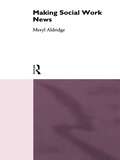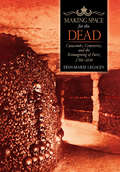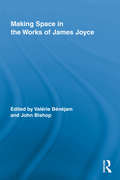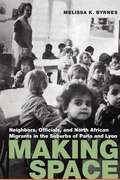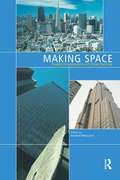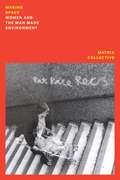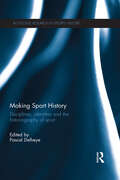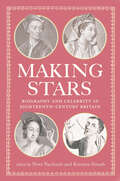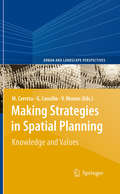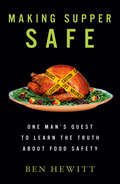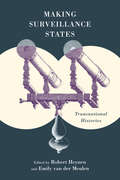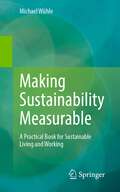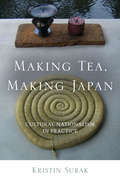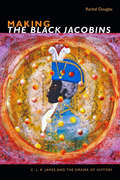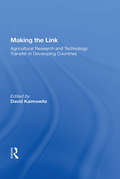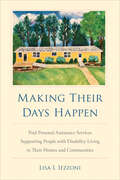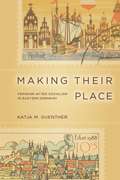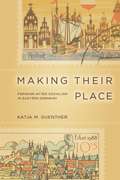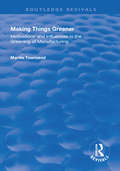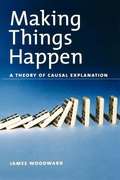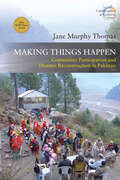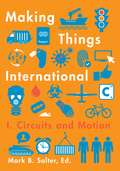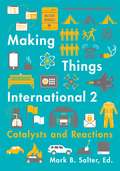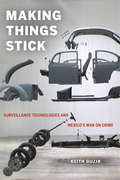- Table View
- List View
Making Social Science Matter
by Bent FlyvbjergMaking Social Science Matter presents an exciting new approach to the social and behavioral sciences including theoretical argument, methodological guidelines, and examples of practical application. Why has social science failed in attempts to emulate natural science and produce normal theory? Bent Flyvbjerg argues that the strength of social sciences lies in its rich, reflexive analysis of values and power, essential to the social and economic development of any society. Richly informed, powerfully argued, and clearly written, this book opens up a new future for the social sciences. Its empowering message will make it required reading for students and academics across the social and behavioral sciences.
Making Social Work News
by Meryl AldridgeFirst published in 1994. Routledge is an imprint of Taylor & Francis, an informa company.
Making Space for the Dead: Catacombs, Cemeteries, and the Reimagining of Paris, 1780–1830
by Erin-Marie LegaceyThe dead of Paris, before the French Revolution, were most often consigned to mass graveyards that contemporaries described as terrible and terrifying, emitting "putrid miasmas" that were a threat to both health and dignity. In a book that is at once wonderfully macabre and exceptionally informative, Erin-Marie Legacey explores how a new burial culture emerged in Paris as a result of both revolutionary fervor and public health concerns, resulting in the construction of park-like cemeteries on the outskirts of the city and a vast underground ossuary. Making Space for the Dead describes how revolutionaries placed the dead at the center of their republican project of radical reinvention of French society and envisioned a future where graveyards would do more than safely contain human remains; they would serve to educate and inspire the living. Legacey unearths the unexpectedly lively process by which burial sites were reimagined, built, and used, focusing on three of the most important of these new spaces: the Paris Catacombs, Père Lachaise cemetery, and the short-lived Museum of French Monuments. By situating discussions of death and memory in the nation's broader cultural and political context, as well as highlighting how ordinary Parisians understood and experienced these sites, she shows how the treatment of the dead became central to the reconstruction of Parisian society after the Revolution.
Making Space in the Works of James Joyce (Routledge Studies in Twentieth-Century Literature)
by John Bishop Valérie BénéjamJames Joyce’s preoccupation with space—be it urban, geographic, stellar, geometrical or optical—is a central and idiosyncratic feature of his work. In Making Space in the Works of James Joyce, some of the most esteemed scholars in Joyce studies have come together to evaluate the perception and mental construction of space, as it is evoked through Joyce’s writing. The aim is to bring together several recent trends of literary research and criticism to bear on the notion of space in its most concrete sense. The essays move dialectically out of an immediate focus on the phenomenological and intra-psychic, into broader and wider meditations on the social, urban and collective. As Joyce’s formal experiments appear the response to the difficulty of enunciating truly the experience of lived space, this eventually leads us to textual and linguistic space. The final contribution evokes the space with which Joyce worked daily, that of his manuscripts—or what he called "paperspace." With essays addressing all of Joyce's major works, this volume is a critical contribution to our understanding of modernism, as well as of the relationship between space, language, and literature.
Making Space: Neighbors, Officials, and North African Migrants in the Suburbs of Paris and Lyon (France Overseas: Studies in Empire and Decolonization)
by Melissa K. ByrnesSince the 2005 urban protests in France, public debate has often centered on questions of how the country has managed its relationship with its North African citizens and residents. In Making Space Melissa K. Byrnes considers how four French suburbs near Paris and Lyon reacted to rapidly growing populations of North Africans, especially Algerians before, during, and after the Algerian War. In particular, Byrnes investigates what motivated local actors such as municipal officials, regional authorities, employers, and others to become involved in debates over migrants&’ rights and welfare, and the wide variety of strategies community leaders developed in response to the migrants&’ presence. An examination of the ways local policies and attitudes formed and re-formed communities offers a deeper understanding of the decisions that led to the current tensions in French society and questions about France&’s ability—and will—to fulfill the promise of liberty, equality, and fraternity for all of its citizens. Byrnes uses local experiences to contradict a version of French migration history that reads the urban unrest of recent years as preordained.
Making Space: Property Development and Urban Planning (An\arnold Publication Ser.)
by Andrew MacLaranMaking Space studies the built environment by examining the private-sector forces responsible for its development and the urban planning systems put in place to influence, guide and manipulate its outcomes.The first part provides a theoretical context for understanding the functions of the property development sector and the state's interventions through the medium of urban planning. It analyses the relationship between planning and development, and focuses on the increasingly widespread adoption of more pro-active entrepreneurial planning agendas as a response to a growing disenchantment with traditional regulatory approaches.The second part comprises case studies (drawn from Australia, New Zealand, the USA, the United Kingdom and Ireland) which investigate the ways in which urban planning in different socio-political contexts has influenced the outcomes of the property development process as well as the manner in which such planning systems have changed in order to enhance their influence.
Making Space: Women and the Manmade Environment
by MatrixTimely re-issue of the groundbreaking manifesto for feminist architectureMaking Space is a pioneering work first published in 1984 which challenges us to look at how the built environment impacts on women&’s lives. It exposes the sexist assumptions on gender and sexuality that have a fundamental impact on the way buildings are designed and our cities are planned.Written collaboratively by the feminist collective Matrix, tthe book provide a full blown critique of the patriarchal built environment both in the home and in public space, and outline alternative forms of practice that are still relevant today. Making Space remains a path breaking book pointing to possibilities of a feminist future.Some authors worked for the London-based Matrix Feminist Architect&’s collective, an architectural practice set up in 1980 seeking to establish a feminist approach to design. They worked on design projects—such as community, children and women&’s centres. Others were engaged in building work, teaching and research.The new edition comes with a new introduction examining the context, process and legacy of Making Space written by leading feminists in architecture.
Making Sport History: Disciplines, identities and the historiography of sport (Routledge Research in Sports History)
by Pascal DelheyeThe field of sport history is a relatively new research domain, situated at the intersection of a number of disciplines and sub-disciplines. This interdisciplinarity has created interesting avenues for growth and fresh thinking but also inherent problems of coherence and identity. Making Sport History examines the development of an academic community around sport history, exploring the roots of the discipline, its current boundaries, borders and challenges, and looking ahead at future prospects. Written by a team of world-leading sport historians, with commentaries from scholars working outside of the sport historical mainstream, the book considers key themes in the historiography of sport, including: The relationship between history, sport studies and physical education Comparative analysis of the role of historians in the writing of sport history Modern and post-modern approaches to sport history Race, gender and the sport historical establishment The role of scholarly organisations, conferences and journals in discipline-building Presenting new perspectives on what constitutes sport history and its core methodologies, the book helps explain why historians have become interested in sport, why they’ve chosen the topics they have, and how their work has influenced the wider world of history and been influenced by it. Making Sport History is essential reading for any advanced student, scholar or researcher with an interest in sport history, historiography, or the history and philosophy of the social sciences.
Making Stars: Biography and Celebrity in Eighteenth-Century Britain (Performing Celebrity)
by Glynis Ridley Stuart Sherman Jack Lynch Rebecca Tierney-Hynes Sarah Ailwood Miriam L. Wallace Sören Hammerschmidt Jane Wessel Heather McPherson Elaine McGirr Semane Parsons Kevin Bourque Anne Betty Weinshenker Teri Doerksen Kirsten Teresa SaxtonIn bringing biography and celebrity together, the essays in Making Stars interrogate contemporary and current understandings of each. Although biography was not invented in the eighteenth century, the period saw the emergence of works that focus on individuals who are interesting as much, if not more, for their everyday, lived experience than for their status or actions. At the same time, celebrity emerged as public fascination for the private lives of publicly visible individuals. Biography and celebrity are mutually constitutive, but in complex and varied ways that this volume unpacks. Contributors to this volume present us a picture of eighteenth-century celebrity that was mediated across multiple sites, demonstrating that eighteenth-century celebrity culture in Britain was more pervasive, diverse and, in many ways, more egalitarian, than previously supposed.
Making Strategies in Spatial Planning
by Grazia Concilio Valeria Monno Maria CerretaThis book discusses strategic spatial planning with emphasis on the role of values and cognitions dynamics within the planning-evaluation interplay. In the book, values and cognitions dynamics are investigated as crucial aspects of planning practices devoted to the development of strategic actions strictly linked to spatial contexts. Different methodologies and approaches are examined to support collaborative decision making and to manage comprehensive and participatory knowledge throughout strategic planning processes. The discussion is carried out from both theoretical and practical points of view. The book also dissects the multiple meanings of strategic planning and its implication in terms of mobilization and creation of values and knowledge. Critical issues are examined in relation to both the dynamics of negotiation and construction of diverse values and knowledge in planning processes, and in relation to some experiences carried out in different urban contexts.
Making Supper Safe: One Man's Quest to Learn the Truth about Food Safety
by Ben HewittFood recalls have become so ubiquitous we hardly even notice them. The massive peanut salmonella contamination of 2008–2009 alone killed nine and sickened an estimated 22,500 people; only a few weeks later, contaminated frozen cookie dough sent 35 people to the hospital. These tragic, inexcusable events to which no one is immune are but a symptom of a broader food system malaise.In Making Supper Safe, Ben Hewitt exposes the vulnerabilities inherent to the US food industry, where the majority of our processing facilities are inspected only once every seven years, and where government agencies lack the necessary resources to act on early warning signs. The most dangerous aspect of our food system isn't just its potential to make us acutely ill, but the ever expanding distance between us and our sources of nourishment.Hewitt introduces a vibrant cast of characters and revolutionaries who are reinventing how we grow, process, package, distribute, and protect our food, and even how we protect ourselves. He takes readers inside a food contamination trace-back investigation, goes dumpster diving, and talks to lawyers, policy makers, and families who have been affected by contaminated food. Making Supper Safe explains why we should worry, but it is also a quest to understand how we can learn to trust our food again.
Making Surveillance States: Transnational Histories
Making Surveillance States: Transnational Histories opens up new and exciting perspectives on how systems of state surveillance developed over the nineteenth and twentieth centuries. Taking a transnational approach, the book challenges us to rethink the presumed novelty of contemporary surveillance practices, while developing critical analyses of the ways in which state surveillance has profoundly shaped the emergence of contemporary societies. Contributors engage with a range of surveillance practices, including medical and disease surveillance, systems of documentation and identification, and policing and security. These approaches enable us to understand how surveillance has underpinned the emergence of modern states; sustained systems of state security; enabled practices of colonial rule; perpetuated racist and gendered forms of identification and classification; regulated and policed migration; shaped the eugenically inflected medicalization of disability and sexuality; and contained dissent. While surveillance is thus bound up with complex relations of power, it is also contested. Emerging from the book is a sense of how state actors understood and legitimized their own surveillance practices, as well as how these practices have been implemented in different times and places. At the same time, contributors explore the myriad ways in which these systems of surveillance have been resisted, challenged, and subverted.
Making Sustainability Measurable: A Practical Book for Sustainable Living and Working
by Michael WühleMaking something measurable means being able to control it Sustainability is a term with a wealth of meanings and many possible misinterpretations. Yet sustainability can be a powerful and effective tool to guide our practical actions and simplify complicated decisions. Sustainability can save costs and stabilize any organization and company. It protects the climate and the environment and leads all people into a good future. The non-fiction book "Making Sustainability Measurable" is a practical guide on how methods and instruments of sustainability can be used successfully - be it in professional life or in private and voluntary engagement. The book not only provides the interested layperson with a comprehensive overview of the central aspects of sustainability management, it also offers practitioners important decision-making aids and tips for implementation. The easy-to-understand style conveys all the essential contents of the topic of sustainability even to newcomers. Whether you have previous knowledge or not - with the many immediately implementable "best practices", the book offers a lot of practical application possibilities. The appendices contain unrestricted tools from the author's practice for the introduction of successful sustainability management.
Making Tea, Making Japan: Cultural Nationalism in Practice
by Kristin SurakThe tea ceremony persists as one of the most evocative symbols of Japan. Originally a pastime of elite warriors in premodern society, it was later recast as an emblem of the modern Japanese state, only to be transformed again into its current incarnation, largely the hobby of middle-class housewives. How does the cultural practice of a few come to represent a nation as a whole? Although few non-Japanese scholars have peered behind the walls of a tea room, sociologist Kristin Surak came to know the inner workings of the tea world over the course of ten years of tea training. Here she offers the first comprehensive analysis of the practice that includes new material on its historical changes, a detailed excavation of its institutional organization, and a careful examination of what she terms "nation-work"-the labor that connects the national meanings of a cultural practice and the actual experience and enactment of it. She concludes by placing tea ceremony in comparative perspective, drawing on other expressions of nation-work, such as gymnastics and music, in Europe and Asia. Taking readers on a rare journey into the elusive world of tea ceremony, Surak offers an insightful account of the fundamental processes of modernity-the work of making nations.
Making The Black Jacobins: C. L. R. James and the Drama of History (The C. L. R. James Archives)
by Rachel DouglasC. L. R. James's The Black Jacobins remains one of the great works of the twentieth century and the cornerstone of Haitian revolutionary studies. In Making The Black Jacobins, Rachel Douglas traces the genesis, transformation, and afterlives of James's landmark work across the decades from the 1930s on. Examining the 1938 and 1963 editions of The Black Jacobins, the 1967 play of the same name, and James's 1936 play, Toussaint Louverture—as well as manuscripts, notes, interviews, and other texts—Douglas shows how James continuously rewrote and revised his history of the Haitian Revolution as his politics and engagement with Marxism evolved. She also points to the vital significance theater played in James's work and how it influenced his views of history. Douglas shows The Black Jacobins to be a palimpsest, its successive layers of rewriting renewing its call to new generations.
Making The Link: Agricultural Research And Technology Transfer In Developing Countries
by David KaimowitzThis book is about International Service for National Agricultural Research's (ISNAR) study to identify key factors that influenced the effectiveness and efficiency of links between research and technology transfer. It recommends ways to improve these links and reflects the progress made till date.
Making Their Days Happen: Paid Personal Assistance Services Supporting People with Disability Living in Their Homes and Communities
by Lisa I. IezzoniMost Americans—even those with significant disability—want to live in their homes and communities. Unpaid family members or friends often work as “informal” caregivers, helping those who need assistance— and many feel they have no option but to serve. In contrast, paid personal assistance services workers (PAS) provide a lifeline to those consumers with complex needs and limited social networks. However, there is a crisis looming in the increasing needs for paid PAS and the limited available PAS workforce. Making Their Days Happen explores disability, health, and civil rights, along with relevant federal and state labor policies related to personal assistance services. Lisa Iezzoni addresses the legal context of paid PAS as well as financing mechanisms for obtaining home-based personal assistance. She also draws upon interviews she conducted with paid PAS consumers and PAS workers to explore PAS experiences and their perspectives about their work. Offering recommendations for improving future experiences of PAS consumers and providers, Iezzoni emphasizes that people with disabilities want to be a part of society, and PAS workers who do this low-wage work find satisfaction in helping them achieve their goals.
Making Their Place: Feminism After Socialism in Eastern Germany
by Katja GuentherThe collapse of state socialism in eastern and central Europe in 1989 had a dramatic impact on women. Witnessing the loss of state support for their economic activity, the curtailing of their reproductive rights, and the rise of gender ideologies that value women primarily as mothers and wives rather than as active participants in the workforce, women across eastern and central Europe organized on a local level to resist these changes. Making Their Place brings to light how feminist movements in two eastern German cities, Erfurt and Rostock, utilized local understandings of politics and gender to enhance their possibilities for meaningful social change. The book chronicles the specific reasons why place matters, the importance of localized experiences during the socialist era, and how history shapes contemporary identities, cultures, and politics. What emerges is the fascinating story of the different ways people have struggled to define themselves, their values, and their understandings of gender in a period of monumental social, economic, and political upheaval.
Making Their Place: Feminism After Socialism in Eastern Germany
by Katja M. Guenther<div><p class="first">The collapse of state socialism in eastern and central Europe in 1989 had a dramatic impact on women. Witnessing the loss of state support for their economic activity, the curtailing of their reproductive rights, and the rise of gender ideologies that value women primarily as mothers and wives rather than as active participants in the workforce, women across eastern and central Europe organized on a local level to resist these changes. <br></p><p><i>Making Their Place</i> brings to light how feminist movements in two eastern German cities, Erfurt and Rostock, utilized local understandings of politics and gender to enhance their possibilities for meaningful social change. The book chronicles the specific reasons why place matters, the importance of localized experiences during the socialist era, and how history shapes contemporary identities, cultures, and politics. What emerges is the fascinating story of the different ways people have struggled to define themselves, their values, and their understandings of gender in a period of monumental social, economic, and political upheaval.</p></div>
Making Things Greener: Motivations and Influences in the Greening of Manufacturing (Routledge Revivals)
by Mardie TownsendFirst published in 1998, this volume looks at the potential and motivation for companies and industries to go green. Mardie Townsend examines issues including human behaviour towards the environment, structuration theory, why companies go green and factors helping and hindering the ‘greening’ of industry. It emerged as part of an international monograph publishing series covering new research into the ‘green’ issues such as government, corporate and public responses to environmental hazards, the economics of green policies and the effectiveness of environmental protection programmes.
Making Things Happen: A Theory Of Causal Explanation
by James WoodwardWoodward's long awaited book is an attempt to construct a comprehensive account of causation explanation that applies to a wide variety of causal and explanatory claims in different areas of science and everyday life. The book engages some of the relevant literature from other disciplines, as Woodward weaves together examples, counterexamples, criticisms, defenses, objections, and replies into a convincing defense of the core of his theory, which is that we can analyze causation by appeal to the notion of manipulation.
Making Things Happen: Community Participation and Disaster Reconstruction in Pakistan (Catastrophes in Context #5)
by Jane Murphy ThomasDrawing on the Pakistan Earthquake Reconstruction and Recovery Project (PERRP), this volume explores the sociocultural side of post-disaster infrastructure reconstruction. As the latter is often fraught with delays and even abandonment—one cause being ineffective interactions between construction and local people—PERRP used anthropological and participatory approaches. Along with strong construction management, such approaches led to the rebuilding being completed on time. As disasters are increasing in number and intensity, so too will be the need for reconstruction, for which PERRP has lessons to offer.
Making Things International 1: Circuits and Motion
by Mark B. SalterBuilding on recent debates in critical social theory and international relations, Making Things International I: Circuits and Motion presents twenty-five essays that engage the global, the local, and the international through the lens of objects. It represents the first substantial new materialist intervention in global politics and international relations, offering a diverse and provocative set of reflections on how different objects create, sustain, complicate, and trouble the international. Problematizing the stuff of global life, Making Things International focuses on contemporary materialist scholarship on the international realm. The first of two volumes, these original contributions by both new and established scholars examine how war, diplomacy, trade, communication, and mobile populations are made by things: weapons, vehicles, shipping containers, commodities, passports, and more. The authors demonstrate how mundane, everyday objects—not normally understood as international—are in fact deeply implicated in how we think of the world: blood, garbage, viruses, traffic lights, clocks, memes, and ships&’ ballast. Contributors: Michele Acuto, U College London; Peter Adey, Royal Holloway U of London; Rune Saugmann Andersen, U of Helsinki; Jessica Auchter, U of Tennessee at Chattanooga; Mike Bourne, Queen&’s U Belfast; Kathleen P. J. Brennan; Elizabeth Cobbett, U of East Anglia; Stefanie Fishel, Hobart and William Smith Colleges; Emily Gilbert, U of Toronto; Jairus Grove, U of Hawai&‘i at Manoa; Charlie Hailey, U of Florida; John Law, Open U; Wen-yuan Lin, National Tsing-hua U; Oded Löwenheim, Hebrew U of Jerusalem; Chris Methmann; Benjamin J. Muller, U of Western Ontario; Can E. Mutlu, Bilkent U; Geneviève Piché; Joseph Pugliese, Macquarie U; Katherine Reese; Michael J. Shapiro, U of Hawai&‘i at Manoa; Benjamin Stephan; Daniel Vanderlip; William Walters, Carleton U; Melissa Autumn White, U of British Columbia; Lauren Wilcox, U of Cambridge; Yvgeny Yanovsky.
Making Things International 2: Catalysts and Reactions
by Mark B. SalterDrawing widely from contemporary social and critical thought, Making Things International 2 offers provocative interventions into debates about causality, connection, and politics through the notion of assemblage. Political assemblages, especially those that cross national borders, can be catalyzed by a host of surprising sparks. Present-day global systems are complex and interdependent, but the worn tools of traditional international relations theory are unsuited to the task of understanding how objects, ideas, and people come together to create, dispute, solve, or perhaps cause these political configurations. Contributors to this volume bring to their work a new sensitivity toward issues of power, authority, control, and sovereignty.The companion volume, Making Things International 1: Circuits and Motion, used things, stuff, and objects in motion to capture the material dynamics of global politics and to demonstrate the importance of the material. This volume builds on that conversation by examining objects that incite political assemblages. Specific subjects include fighter jets, smartphones, tents, HTTP cookies, representations of North Korea, and histories of the diplomatic cable, the orange prison jumpsuit, and container shipping.Contributors: Rune Saugmann Andersen, U of Helsinki; Josef Teboho Ansorge; Claudia Aradau, King&’s College London; Helen Arfvidsson; Alexander D. Barder, Florida International U; Tarak Barkawi, London School of Economics; Peter Chambers; Shine Choi, Seoul National U; Sagi Cohen; Thomas N. Cooke; Anna Feigenbaum, Bournemouth U; Andreas Folkers, Goethe–U Frankfurt; Fabian Frenzel, U of Leicester; Kyle Grayson, Newcastle U; Nicky Gregson, Durham U; David Grondin, U of Ottawa; Xavier Guillaume, U of Edinburgh; Emily Lindsay Jackson, Acadia U; Miguel de Larrinaga, U of Ottawa; Debbie Lisle, Queen&’s U Belfast; Mary Manjikian, Regent U; Nadine Marquardt, Goethe–U Frankfurt; Patrick McCurdy, U of Ottawa; Adam Sandor; Nisha Shah, U of Ottawa; Julian Stenmanns, Goethe–U Frankfurt; Casper Sylvest, U of Southern Denmark; Rens van Munster, Danish Institute for International Studies; Elspeth Van Veeren, U of Bristol; Srdjan Vucetic, U of Ottawa; Juha A. Vuori, U of Turku; Tobias Wille.
Making Things Stick: Surveillance Technologies and Mexico's War on Crime
by Keith GuzikAt publication date, a free ebook version of this title will be available through Luminos, University of California Press's new Open Access publishing program for monographs. Visit www.luminosoa.org to learn more. With Mexico's War on Crime as the backdrop, Making Things Stick offers an innovative analysis of how surveillance technologies impact governance in the global society. More than just tools to monitor ordinary people, surveillance technologies are imagined by government officials as a way to reform the national state by focusing on the material things--cellular phones, automobiles, human bodies--that can enable crime. In describing the challenges that the Mexican government has encountered in implementing this novel approach to social control, Keith Guzik presents surveillance technologies as a sign of state weakness rather than strength and as an opportunity for civic engagement rather than retreat.

